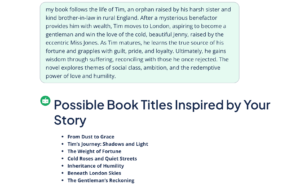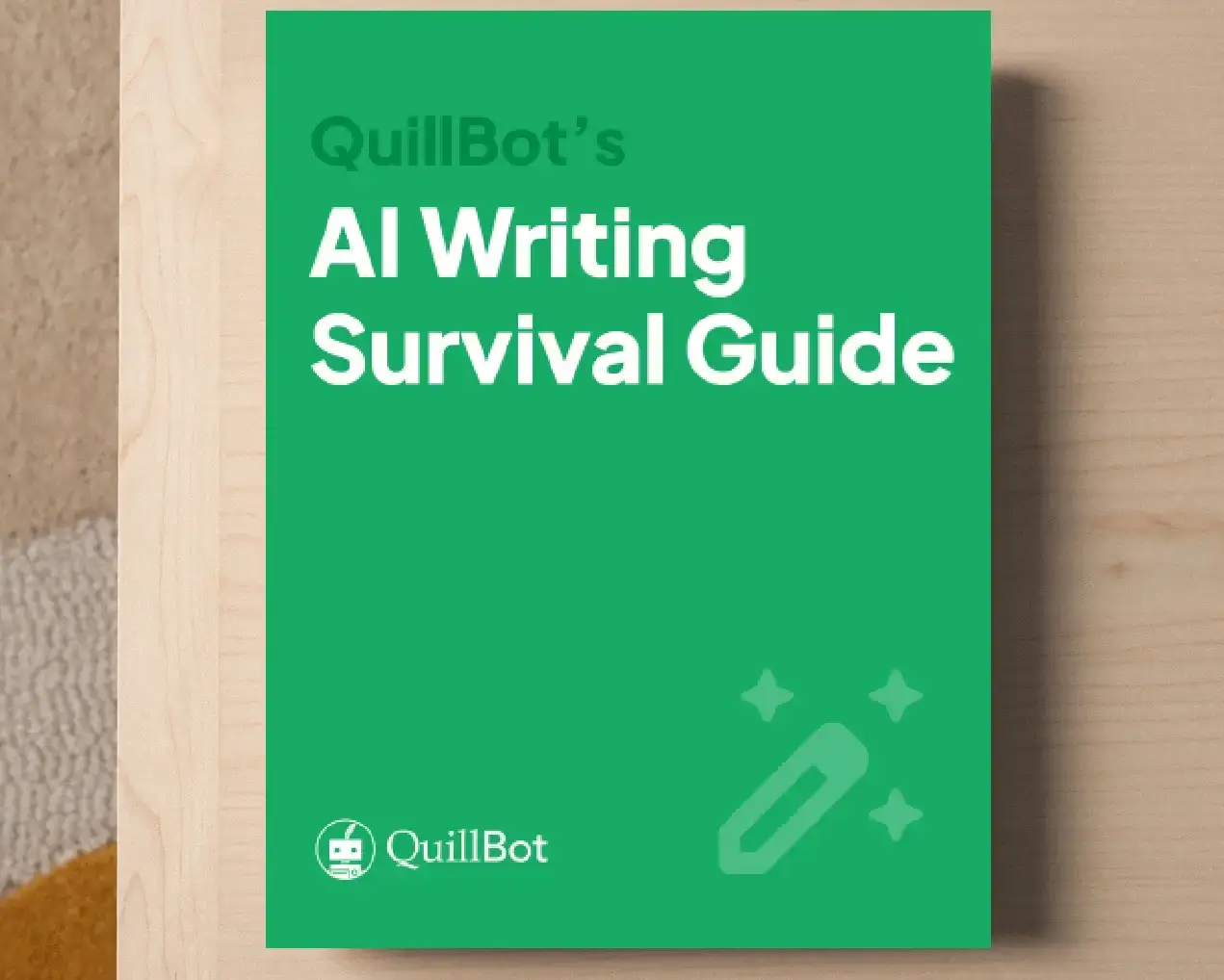AI Book Title Generator | A Complete Guide
It might seem an insignificant detail, but the title of a book can have a profound effect on how successful it is. This is especially true for an unknown author, who has to make their way into the massive field of available publications.
There’s no right or wrong method to coming up with your book’s title, but there are a few things to keep in mind as you make the big decision.
If the whole process seems too daunting, then you can turn to an AI book title generator like QuillBot’s book title generator. Tell it something about your work, and it will suggest a number of possible titles for you to choose from.
How to come up with a book title
Although there are no hard-and-fast rules, there are some things to bear in mind when devising your title. Bear in mind that it might be the last thing you do, or you might know the title before you start to write.
And don’t panic—these world-famous books all started off with a different proposed title:
- Pride and Prejudice by Jane Austen (orginally First Impressions)
- The Great Gatsby by F. Scott Fitzgerald (several other titles including First On the Road to West Egg)
- 1984 by George Orwell (orginally The Last Man in Europe)
- To Kill a Mockingbird by Harper Lee (orginally Go Set a Watchman)
- Of Mice and Men by John Steinbeck (orginally Something That Happened)
- Gone with the Wind by Margaret Mitchell (several other titles including Bugles Sang True)
- Dracula by Bram Stoker (orginally The Undead)
- Frankenstein by Mary Shelley (orginally Prometheus Unchained)
1. Think about the content of your book
Your title needs to communicate something of the genre, content, and style of the book. Romance novels will need a title that reflects that, whereas a thriller needs to communicate something of the excitement of the genre.
Jane Austen’s Pride and Prejudice was originally going to be titled First Impressions. There’s no doubt that this would have been an accurate title, but the one we have all come to know somehow conveys the central theme of the novel much more effectively.
2. Consider using quotations
Many books make free use of well-known quotations (or fragments of them) in their titles. The Bible and Shakespeare are common sources, as are well-known sayings or adages. Some examples include:
- The Power and the Glory by Graham Greene from the Lord’s Prayer in the Bible
- Through a Glass Darkly by Donna Leon from 1 Corinthians 13:12 in the Bible (King James translation)
- The Sound and the Fury by William Faulkner from William Shakespeare’s Macbeth
- Brave New World by Aldous Huxley from Shakespeare’s The Tempest
- The Dogs of War by Frederick Forsyth from Shakespeare’s Julius Caesar
- East of Eden by John Steinbeck from Genesis in the King James (KJ) translation of the Bible
- The Sun Also Rises by Ernest Hemingway from Ecclesiastes in the KJ Bible
- One Flew Over the Cuckoo’s Nest by Ken Kesey comes from a children’s nursery rhyme. The rhyme ends with the line, “one flew east, one flew west, one flew over the cuckoo’s nest.”
- All’s Well That Ends Well by William Shakespeare uses a well-known adage from his day
3. Test your idea
Suggest some options to friends and family to ask their opinion. See which possible title engages their interest. You can ask the QuillBot AI Chat for an opinion too!
Using an AI book title generator
There is an easier way to produce an effective, engaging, and intriguing book title, and that is to use an AI book title generator. With QuillBot’s AI book title generator, enter plenty of details into the chat, then wait for the ideas to come.
In the example below you’ll see a prompt briefly outlining Charles Dickens’ Great Expectations and the suggested titles from the AI title generator.
AI book title generator example
Frequently asked questions about AI book title generator
- Where can I find book title ideas for my novel?
-
There are many things to consider when choosing a title for your book. Many authors take quotations from literature (Shakespeare and the Bible are popular choices) to be their titles.
For example, Graham Greene’s The Power and the Glory comes from the King James translation of the Lord’s Prayer in the Bible. William Faulkner’s The Sound and the Fury comes from William Shakespeare’s Macbeth.
One quick way of finding possible titles is to use an AI tool like the QuillBot AI book title generator. It’s free, quick, and easy to use.
- Can AI help me find a title for my book?
-
Absolutely! The QuillBot AI book title generator is an example of an AI tool that helps you to choose your book title. It will offer you a range of options, and if none of them seems right, you can refine the question and keep asking. It won’t get tired!
- How long should a title be?
-
The best titles are long enough to be informative but short enough to read and understand easily. Include key terms early in your title so your readers quickly know what your work is about.
Title length also depends on context—a novel will generally have a shorter title than an academic paper. Some platforms also have title limits. For example, YouTube video titles are limited to 100 characters.
Here are some general guidelines:
- Blog post: 5–15 words
- Book: 3–5 words
- Essay: 5–10 words
- Research paper: 10–15 words
- YouTube video: 40–70 characters
If you want a short, punchy title but still need to provide more information, consider using a subtitle.When trying to craft a title that’s a certain length, tools like QuillBot’s free AI title generator are a great way to expedite the process.
Cite this QuillBot article
We encourage the use of reliable sources in all types of writing. You can copy and paste the citation or click the "Cite this article" button to automatically add it to our free Citation Generator.
Marshall, T. (2025, August 20). AI Book Title Generator | A Complete Guide. Quillbot. Retrieved February 21, 2026, from https://quillbot.com/blog/ai-writing-tools/how-to-use-an-ai-book-title-generator/


